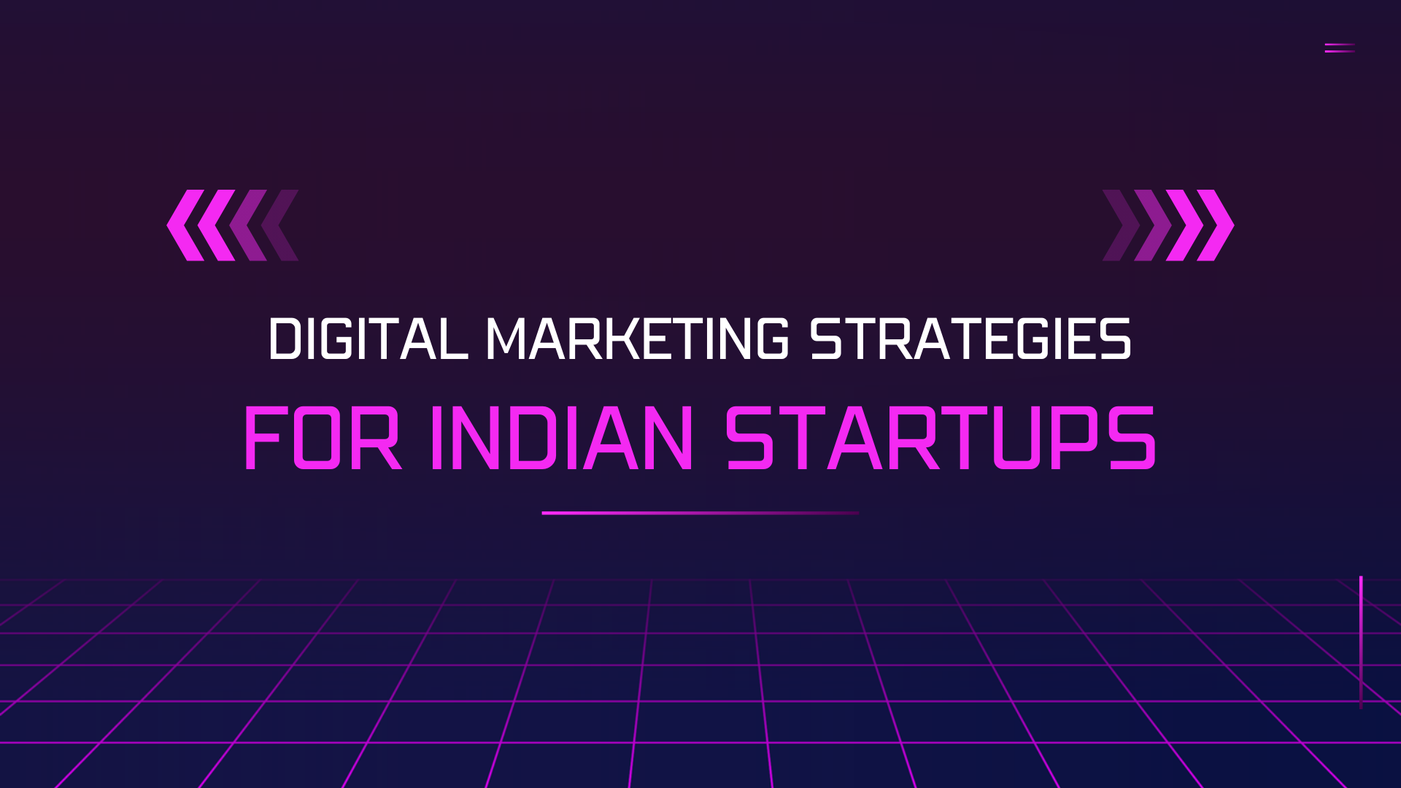In today’s competitive market, digital marketing has become indispensable for startups, particularly in India, where the entrepreneurial ecosystem is thriving. Given limited resources, startups must make the most of their digital marketing efforts. By leveraging cost-effective strategies, small businesses can compete with established players in their industries. This blog will explore key digital marketing strategies that Indian startups can implement to build brand awareness, acquire customers, and achieve sustainable growth.
1. Understanding the Indian Digital Landscape
India is experiencing rapid digital transformation, with over 700 million internet users. The country boasts one of the world’s largest online populations, driven by affordable mobile data and increasing smartphone penetration. For startups, this presents a significant opportunity to reach a wide and diverse audience. However, competition is fierce, and standing out requires a well-thought-out digital marketing strategy that aligns with the needs and behaviors of Indian consumers.
2. Building a Strong Online Presence
One of the first steps in any digital marketing strategy is to create a strong online presence. For Indian startups, this begins with a professional website that is mobile-responsive and user-friendly. Mobile optimization is especially important, given that a large percentage of Indian internet users access the web via smartphones. Your website serves as the cornerstone of your online identity, and it should clearly communicate your brand’s value proposition.
Key Tips:
- Ensure fast loading times for a better user experience.
- Use SEO-friendly content to improve visibility on search engines.
- Integrate a blog section to share valuable content that resonates with your target audience.
3. Search Engine Optimization (SEO)
SEO is a cost-effective way for startups to improve their visibility on search engines like Google. For Indian startups, local SEO is particularly crucial, as many customers prefer finding businesses within their locality. Optimizing your website for relevant keywords can help improve your organic rankings and attract quality traffic without spending a fortune on paid advertising.
SEO Strategies:
- Use long-tail keywords specific to your niche and geographic location.
- Optimize Google My Business listings for local searches.
- Focus on creating high-quality, relevant content that addresses customer pain points.
By consistently publishing content that meets user needs, startups can gradually increase their organic search rankings and attract more traffic.
4. Social Media Marketing
Social media platforms are widely used in India, with Facebook, Instagram, Twitter, and LinkedIn leading the charge. Indian startups can harness the power of these platforms to engage with their audience and promote their products or services. Social media marketing allows businesses to interact directly with customers, share updates, and create communities around their brands.
Best Practices:
- Tailor content to suit each platform’s unique audience. For example, Instagram favors visual content, while LinkedIn is more appropriate for professional updates.
- Leverage influencer marketing by partnering with local influencers to promote your products.
- Run targeted ads on platforms like Facebook and Instagram, where you can reach specific demographics based on location, interests, and behavior.
For startups on a budget, organic social media efforts can be supplemented with low-cost paid ads to increase visibility. Experiment with different ad formats, such as carousel ads or video ads, to see what works best for your brand.
5. Content Marketing
Content marketing is a powerful tool for startups, as it allows you to establish authority in your industry and build trust with your audience. This strategy involves creating and sharing valuable, relevant, and consistent content to attract and engage your target audience. From blog posts and infographics to podcasts and videos, content marketing can take many forms.
Proven Content Ideas:
- Create blog posts that address common industry challenges or answer frequently asked questions.
- Share customer success stories to build social proof.
- Develop video tutorials or product demonstrations to engage viewers.
For Indian startups, a localized content marketing strategy can be particularly effective. By understanding regional languages, cultural nuances, and preferences, businesses can tailor their messaging to resonate with specific audience segments.
6. Email Marketing
While newer forms of digital marketing often steal the spotlight, email marketing remains one of the most cost-effective strategies for startups. With the ability to target specific customer segments, startups can use email marketing to nurture leads, share product updates, and promote exclusive offers.
Email Marketing Tips:
- Build a quality email list by offering incentives, such as downloadable content or discounts.
- Use personalized subject lines and content to improve open and click-through rates.
- Segment your email list based on user behavior or demographics to send more targeted messages.
Indian startups can also use email marketing to send newsletters that provide value, such as industry insights, company updates, or helpful tips. With regular engagement, email can help build stronger relationships with customers and drive repeat business.
7. Influencer Marketing
Influencer marketing is gaining traction in India as a viable strategy for startups looking to expand their reach. By collaborating with influencers who have a large following in your target market, you can gain credibility and access to a new audience. The key to successful influencer marketing lies in selecting the right influencers who align with your brand values and can authentically promote your products.
Steps to Implement:
- Identify micro-influencers within your niche, as they often have a more engaged audience than macro-influencers.
- Create authentic collaborations that don’t feel like overt advertising.
- Track performance metrics such as engagement rates, reach, and conversions.
Startups with limited budgets can partner with smaller, niche influencers who are often more affordable than celebrity influencers. The personal connection these influencers have with their followers can make the promotion more impactful.
8. Pay-Per-Click (PPC) Advertising
For startups that want to quickly boost visibility, PPC advertising is an effective option. Platforms like Google Ads and Facebook Ads allow businesses to bid on keywords or target specific audiences to display their ads. Unlike traditional advertising, PPC is performance-based, meaning you only pay when someone clicks on your ad.
PPC Tips for Startups:
- Start small with a limited budget to test different ad formats and targeting options.
- Use geo-targeting to focus on specific regions within India.
- Continuously optimize your campaigns by analyzing data and making adjustments.
With PPC, Indian startups can quickly gain exposure and drive traffic to their websites. However, the key is to carefully monitor ad spend and ROI to ensure cost-effectiveness.
9. Analytics and Performance Tracking
No digital marketing strategy is complete without proper performance tracking. Using analytics tools such as Google Analytics, startups can track important metrics such as website traffic, user behavior, and conversion rates. Understanding how your campaigns are performing enables you to make data-driven decisions and optimize your marketing efforts for better results.
What to Track:
- Website traffic sources (organic, paid, social media, etc.)
- Conversion rates and user engagement.
- Bounce rate and time spent on your website.
By regularly reviewing your performance data, you can identify areas for improvement and refine your strategy over time. Indian startups that prioritize data-driven marketing are better positioned to scale efficiently and maximize ROI.
10. Collaborations and Partnerships
Startups in India can benefit from collaborating with complementary businesses to expand their reach and tap into new audiences. For example, a fintech startup could partner with an e-commerce platform to offer seamless payment solutions, while a health-focused startup could collaborate with wellness influencers to promote their products.
Collaboration Ideas:
- Co-host webinars or online events to share valuable content with each other’s audiences.
- Offer bundled services or products as part of a partnership promotion.
- Cross-promote on social media channels for increased visibility.
Partnerships not only increase brand exposure but can also provide startups with valuable industry connections and insights.
Conclusion
Digital marketing is crucial for Indian startups seeking to carve out a niche in a competitive market. With the right strategies in place, businesses can build a strong online presence, engage with their audience, and achieve long-term growth. By focusing on cost-effective methods such as SEO, content marketing, social media, and influencer collaborations, startups can maximize their resources and drive results without overspending.
Visit us : https://digitalsolutiontech.com/
visit our LinkedIn: https://www.linkedin.com/company/digitalsolutiontech/






Leave A Comment